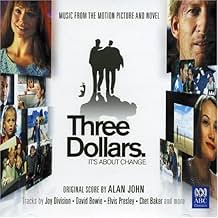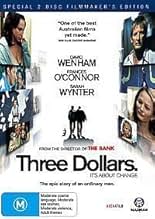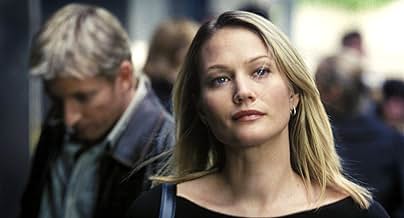Ajouter une intrigue dans votre langueTHREE DOLLARS is the story of Eddie, an honest, compassionate man who finds himself with a wife, a child, and three dollars. Eddie's world revolves around the three women in his life: his br... Tout lireTHREE DOLLARS is the story of Eddie, an honest, compassionate man who finds himself with a wife, a child, and three dollars. Eddie's world revolves around the three women in his life: his brilliant wife Tanya, a passionate academic, their six year old daughter Abby, who heightens... Tout lireTHREE DOLLARS is the story of Eddie, an honest, compassionate man who finds himself with a wife, a child, and three dollars. Eddie's world revolves around the three women in his life: his brilliant wife Tanya, a passionate academic, their six year old daughter Abby, who heightens the stakes on every decision Eddie makes, and his childhood sweetheart, the beautiful, pr... Tout lire
- Réalisation
- Scénario
- Casting principal
- Récompenses
- 4 victoires et 5 nominations au total
- Young Eddie's Father
- (as Keiron O'Leary)
Avis à la une
I think it was because I was hoping for some kind of payoff for investing time with these characters and a story that rings true to many adults.
Instead all this is is a purely emotionally manipulative film, catering to the audience's basic fears of unemployment and being poor - the fact that this successful couple could be so under "stress" after 2 days in which (however unlikely in real life) they both lose their jobs despite having family and friend support networks (and like a poster-er above said, Australia's welfare state to rely on) and wind up digging in garbage bins is just laughable. Even as a metaphor it's just pathetic and manipulative.
What was the point of this film? I just wasted 2 hours of my life on it and there was little redeeming quality.
Plus, the flashbacks were very bad in terms of clothes and using the same actors. Also the timeline just didn't work as Joy Division came out in the late 70's until 1980 (bonded over by the 2 main actors couple who looked like they were in university) and the movie takes place in 2004 which would mean they were together for 25 or so years by that point and yet only in their mid-30's?? The movie seemed like a big advert for mental health services as it's supposed to be about the changing nature of society and how it's "okay" to be a little stressed and depressed, just get some professional help.
It turns out the reason I could not remember the story is that there is no story. Story's begin to develop but then get forgotten, by the end of the movie, you are left feeling that there was no point at all. The last half hour feels extremely forced and the previous hour or so spends to much time in the past rather than setting up the ending.
Sure, movies don't always have to follow the three act structure, but they need to be good in some aspect, perhaps amazingly shot, or fantastic dialogue, something.
David was the one shining light, as he always gives a great performance, but towards the end, you feel his character is wondering what the point of this movie is just as the viewer is.
If that was the directors intent , then brilliant, unfortunately, it was not.
The Ian Curtis impersonation on the dance floor is fantastic!
Starting off its trailer, no one could get the slightest hint what 3 Dollars was going to be about; so why there was a trailer in the first place? However, Robert Connolly in his Q&A with the premier show of the film in Brisbane repeated more than one time in his answers to the audience that "the film is about a good man being tested in all aspects of his life. Tested in his relation with his wife and daughter. Tested in his morality about his work. Tested in his financial situation, and tested even in the streets he walks on!" The film, as Connolly puts it, is "an epic story of an ordinary man." This definition for the main plot line in 3 dollars took the filmmakers to kind of misleading direction. Do ordinary people make epics? Probably yes, but Three Dollars in fact is not an epic film. It's a film that was frilled with many details that made its interesting story less connection. The film finds its appropriate pace in the last 25 minutes and holds it firmly to the end, but the first 90 minutes were so long that I'm sure many people won't stay on their seats to reach those interesting 25 minutes. Scenes, takes and dialogs were all very long that it could have been shorten. I believe that 3 Dollars strongly needs to be reedited and take off no less than 20 minutes of its unnecessary scenes.
Related to the problem of the film's length, one's could also points out to the problem of that the film spent very long time building up its frilled story just to reach its final pointwhere the ordinary man becomes a tramp for one night. On the way to reach that point, the film mixes many genres for no good reason. Sometimes it looks like black comedy whereas other times it was pure social realism story. Mixing genres, in fact, is good thing to reject Hollywood one-vision style of film-making, but it could be also dangerous exercise if it not done smartly. Mixing genres in 3 dollars seemed illogical and been done in a way that it didn't help the film a lot. Talking about mixing genres I just want to refer here to the homage Connolly had to Hitchcock's North By Northwest. I mean the famous scene where an airplane attacks/follows an unarmed man. This scene, though it was well done/remade in 3 dollars, is a good example for those sequences were audience's attention been drawn to something else rather than the main story.
But 3 Dollars is also a brave Australian film that succeeded avoiding some of the market requirements such as action, gunfights and happy ending. In fact, there is a brave thing about 3 Dollars that deserve special salute: filming the harsh street life of beggars and tramps. I think it is the first Australian film that dealt in this depth with this issue, which most directors usually avoid. Why they avoid it? Because it's hard to be done. Filming the harsh life on poor streets is a harsh practice itself. The best parts of 3 Dollars are those last 25 minutes about the life on the street. While watching those sequences, I was recalling the Australian aboriginal singer Archie Roach's song, Move It On, where he painfully sings, "I was raised on the street/ I'm nobody's fool/ yeah I was raised on the street/ but street can be so cruel".
The man is David Wenham (in the role of Eddie Harnovey) and what a performance he gives: an unexciting environmental chemist never evoked such pathos. His altruism, his silly kindnesses, endear him too us; they seem a truly authentic response from a man accustomed to being the charity-giver, and who's sense of himself won't let him admit that the tables have now turned. Living that lie, just for a little while longer, to postpone a hard decision or realisation: this is an experience we've all had, and Wenham plays it so well, subtly hinting at deeper more honest feelings.
Molokai, Getting Square, The Boys, The Proposition, Dust: Wenham has demonstrated an impressive acting range across his oeuvre thus far. Any fan must watch Three Dollars to see yet another thing this man can do with aplomb. His principal companions in this film, Frances O'Connor and Robert Menzies, also turn in fine performances.
I really appreciated Three Dollars' subtle character development. Robert Connolly's screenplay is a fine one, and his unobtrusive visual style really worked for the material. Others on IMDb have criticised this film for being slow, and possessing some pointless episodes; the phrase which best describes these bits is character development! No, this film doesn't have the steroidal plot of your average Hollywood blockbuster. But, by the same token, your average Hollywood blockbuster never comes close to the complex, unglamorous emotional journey depicted here. If you can appreciate a film which doesn't consist of a series of Indiana Jones style trials, you've found a winner. If you don't have an art house sensibility then you might find this film a little diffuse, but I still recommend the challenge.
One only has to read this site's negative reviews to discover this film has a credibility problem. I found it very authentic; two close friends in the employ of Australia's social welfare provider (Centrelink) agree with me. So why is it that people don't believe the events of this film could reasonably happen? The answer is that people expressing such opinions have an unrealistic faith in their employment protections and social welfare system; if one has never lived on the edge, or been in close contact with people who have, one often has such misapprehensions.
Australian corporations regularly lay off large numbers of people: a process euphemistically called 'restructuring'. In Australia, sacking one person is legally fraught: sacking many is legally painless. Companies will announce there intention to do so well in advance, but, in my company at least, you are told you've been sacked on the day that you finish. It's happened twice at my office, and a couple of people have been very surprised.
If your one of those people who didn't really plan for the eventuality, even if you run to the welfare office (Centrelink), you'll run into several weeks delay while your case gets processed; how do you feed your family in the mean time? Most people resort to credit, but not everyone has the luxury; David Wenham's character probably has a ten thousand dollar Amex debt from his recent 'unapproved' business travel.
I have seen a former director, sacked without notice, march into my Fortune 500 company's office, with his entire family, demanding that his entitlements be processed for payment then and there; he forcefully proclaimed for all in the open plan office to hear, "I have to feed these people you know!" How improbable? How true! A sole bread-winner who is absorbed in their work, who is impractical, in debt, and manages his finances from week to week (a character which David Wenham convincingly inhabits) could easily find himself in the Three Dollars situation.
What is so sad about this film is that some people reject it as unrealistic when, in fact, a similar thing happens to an Australian every day. Very soon in Australia there will be no protection against unfair dismissal for employees of companies with up to one hundred people. None whatsoever. This isn't forecasting on my part, but a matter which has already been passed into law. It's easy to see from other comments relating to this film how such laws succeed; our prime minister, 'Honest' John Howard, couldn't possibly sponsor such a bill? Could he? The problem of the disjunction between what is actually true and what people are prepared to believe is a problem faced by better films all the time. The only solution, I suppose, is to keep making them, and thereby change peoples' misconceptions. I encourage overseas watchers to give this story the benefit of the doubt; it is really quite a truthful one, I assure you.
To make an analogy, few Australians would be aware that a pistol with a silencer makes a noise of 110 decibels or more (that's louder than a pneumatic drill or someone shouting in your ear). Many would wonder where the noise came from if Kiefer Sutherland ever used anything like the real thing; and, sure enough, comments would appear on IMDb saying, "How unrealistic was that!" Those reviews that proclaim Three Dollars to be unrealistic are making the same mistake: their point of reference is not reality.
Take the leap with this film, even if what happens offends your belief in the justice of your society: your belief may well be unjustified.
It's good to see a film tackling this unpopular but important subject.
Three Dollars is an affecting character-driven drama. The central performances are truly excellent. It is a melancholy film, but a certain wry humour keeps it afloat. It is saddest in its comment on society; more than a little optimism can be found in Eddie's final situation: provided you value self-realisation over money.
Le saviez-vous
- GaffesA busker is seen playing "Ode to Joy" solo on on a ukulele. The audio track clearly features two ukuleles playing rhythm and lead parts.
- ConnexionsFeatured in The Political Arena (2005)
Meilleurs choix
Détails
Box-office
- Montant brut mondial
- 872 846 $US
- Durée
- 1h 58min(118 min)
- Couleur
- Mixage


























